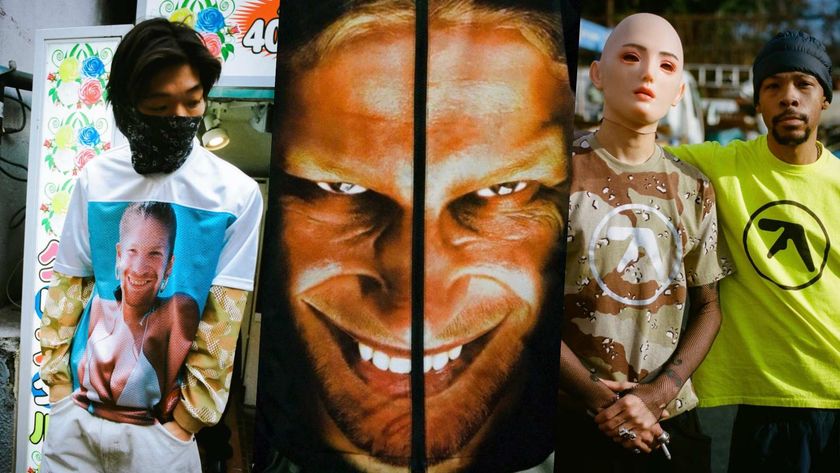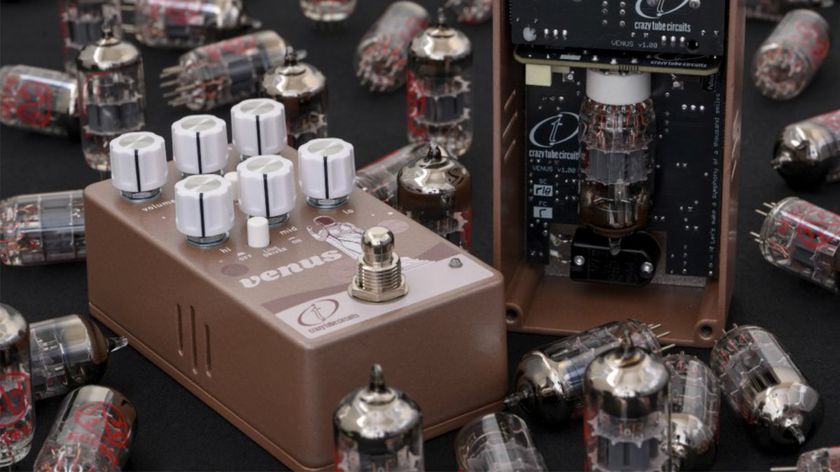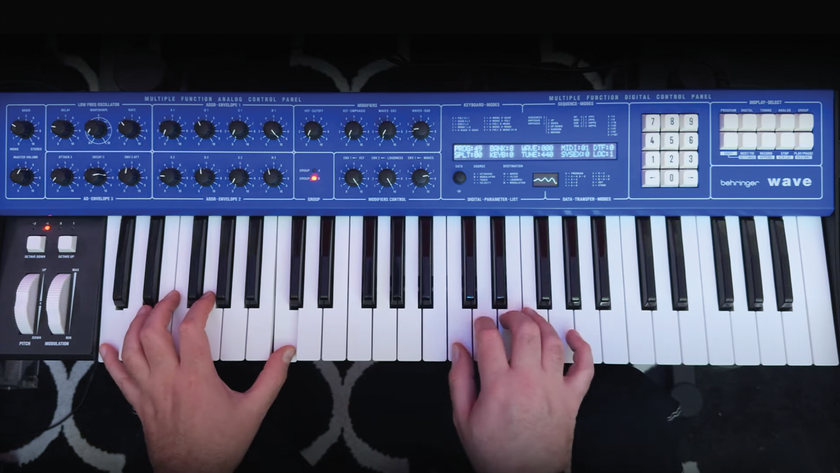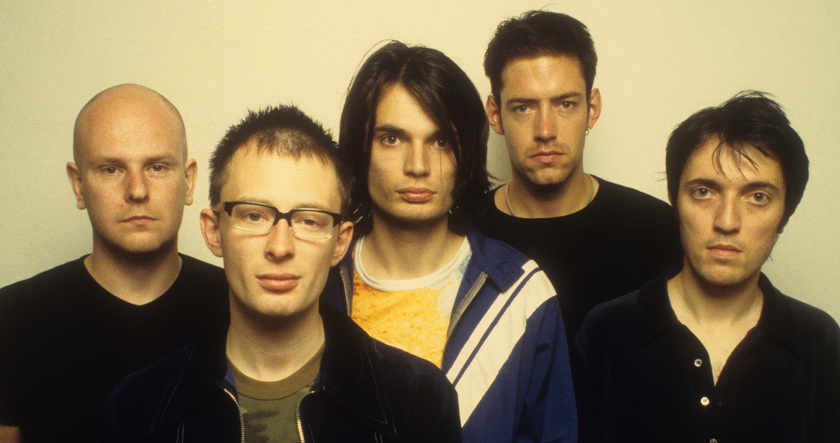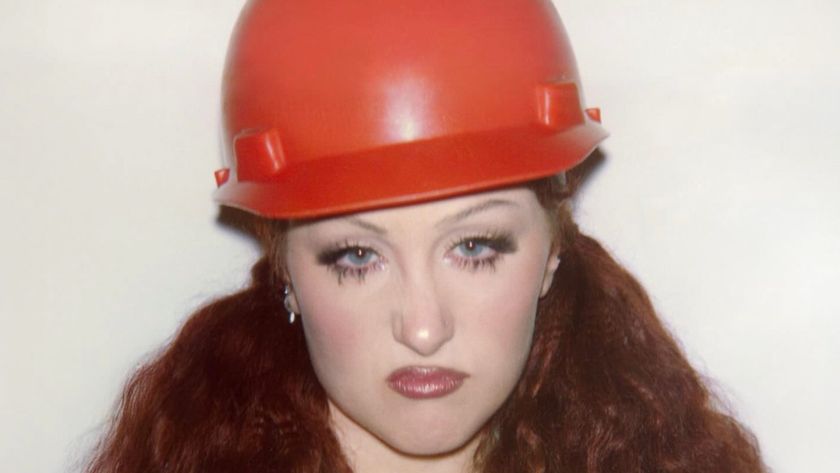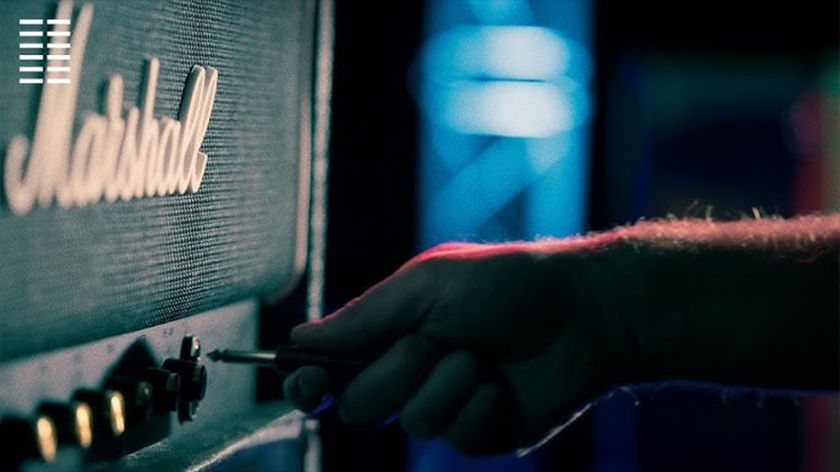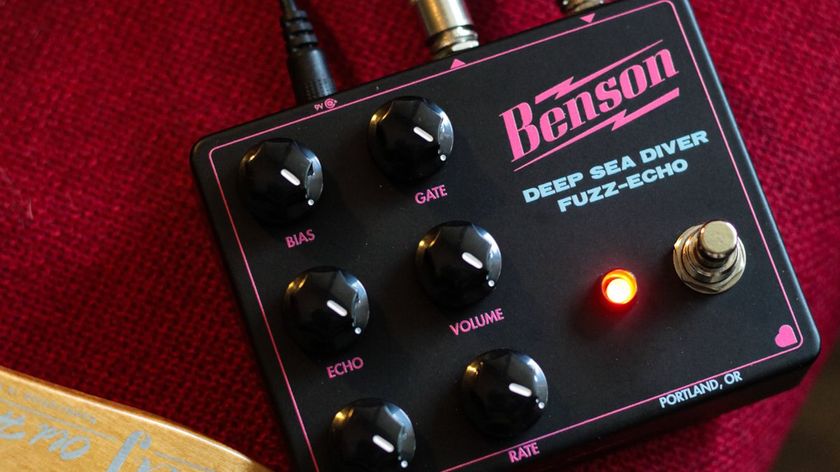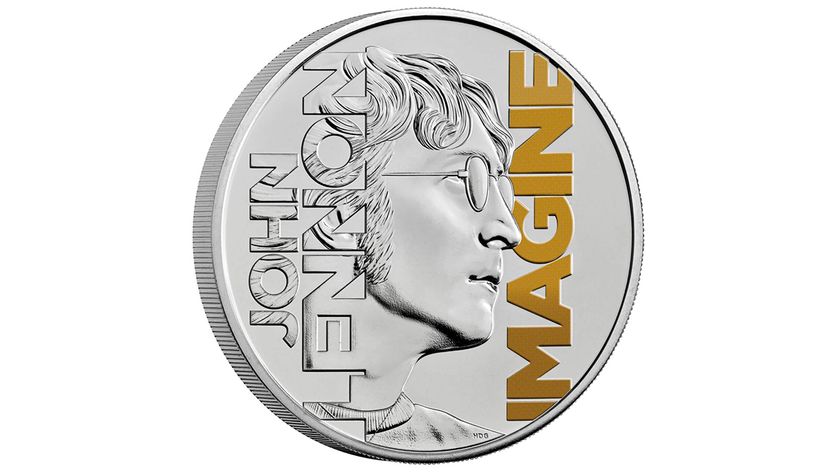Dave Mustaine and Kiko Loureiro talk Megadeth's Dystopia
The two guitarists on the band's 15th studio album
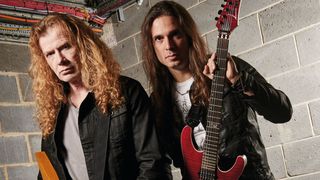
Introduction
Dave Mustaine is in total control. There are no more compromises, and he’s taking no prisoners with Megadeth’s latest album of ‘intellectual speed metal’, ‘Dystopia’. We meet the boss, and new recruit Kiko Loureiro.
Dave Mustaine is many things but a Yes man isn’t one of them. “Hey, Rick!” he yells to a crew member who has poked his head in the door.
The Megadeth frontman, guitarist and commander-in-chief seems in good spirits
“Will you tell them to get this fucking song off? I’ve told them about this music. This is not metal; this is Yes.” Rick, and sadly it’s not Rick Wakeman, disappears, the door shuts and there’s a moment’s pause.
“Sorry, I don’t get it,” he continues. “They were playing fucking Duran Duran the other day. It’s like if you’re trying to be funny, you’re not funny. If this is the kind of music you like, you’re on the wrong tour, buddy.”
Nothing escapes Mustaine’s attention. The doors are open at SSE Wembley Arena. In a few hours, Megadeth will be onstage, closing a bill featuring co-headliners Lamb Of God, with support from Children Of Bodom and Sylosis.
The Megadeth frontman, guitarist and commander-in-chief seems in good spirits. He’s perched on a chair, talking at great pace (over 140 words-per-minute) about Megadeth’s forthcoming album, Dystopia, and of a personnel switch that has seen the core of Mustaine and bassist Dave ‘Junior’ Ellefson reenergized with a transfusion of new blood.
Drummer Shawn Drover departed after a 10-year stint and has been replaced by Lamb Of God’s Chris Adler, with Kiko Loureiro of Brazilian power-metal quintet Angra taking over from Chris Broderick on lead guitar.
Don't Miss
Megadeth's Dave Mustaine: my top 5 tips for guitarists
Dave Mustaine on Super Collider, Endgame, Risk and more
Megadeth's Dave Mustaine talks guitar, politics and today's music

All hail the new flesh
Adler, who is pulling double shifts on this tour, is a neat fit. A friend and super-fan, his style was influenced by the late Gar Samuelson, who drummed on Megadeth’s first two records, and like Lamb Of God, they are beholden to groove and rhythm.
“I consider myself to be a better rhythm player than a lead player, and I think that, at the end of the day, if a song doesn’t have rhythm you don’t have a song,” says Mustaine.
Loureiro’s effervescent lead playing references Latin jazz, fusion and traditional Brazilian and Spanish music
“Getting in the studio with [Chris] was brilliant because he had intimated to me that Gar Samuelson was a big influence on him, and Gar and I, our playing styles were what set Megadeth on its course with the whole jazz metal and intellectual speed metal kind of stuff.”
Dystopia is a modern, precision strike of steely thrash and that crisp speed metal. Lyrically, it’s twitchy and paranoid, informed by a conspiratorial reading of American politics.
Although Dystopia drafts an agenda from real-life turmoil as refracted through Mustaine’s worldview, its sound rolls back the years, evoking vintage Megadeth. There is an elastic feel to the riff-work and Adler’s beats – what Mustaine calls the “Megadeth lag” – rooted in jazz yet transposed to metal.
Loureiro’s effervescent lead playing references Latin jazz, fusion and traditional Brazilian and Spanish music, complementing Mustaine’s instinctual and animalistic style in much the same way as Chris Poland and Marty Friedman did through the 80s and 90s.
“I think that Kiko has a lot of what Chris Poland and Marty Friedman were capable of doing,” says Mustaine, before noting that he often vocally authored Poland and Friedman’s solos.
“…there’s enough video footage of me with other players singing the solos to them. The way that we approach things in the studio is very simple. We have a three-pronged approach; there’s your way, our way, my way. We’ll listen to a solo they come up with, and if it’s a great solo, so be it. If it’s really good, I will make some suggestions to take it to what I think is that place, and if it’s not right, then I’ll say, ‘Let’s try this instead.’
“You listen to their ideas... That respect that you give to another performer, man, you get a performance outta them that sometimes is absolutely mind-blowing. The solo [Kiko] did on Conquer Or Die, I didn’t tell him how to do that but I had been encouraging him for weeks to do something like Eruption.”

Straight from the source
Kiko Loureiro didn’t audition for Megadeth. He sent them a video of himself playing four classic tracks, but his playing was never in doubt.
“[Mustaine] wanted to know me as a person,” says Loureiro. “We had lunch. We had coffee. Then we had dinner. I went to his house and just hanged for a day. That was the audition, just hanging in Nashville.”
I got to learn how to really play the thrash metal riffs from the source. Y’know, Mustaine
Mustaine has said Loureiro’s playing intimidated him, but that’s a two-way street when a relatively unknown guitarist joins a band with Megadeth’s prestige and history. Speaking a couple of weeks after the Wembley show, Loureiro admits to being intimidated initially, but only because of the pressure inherent in taking on a high-profi le gig with one of the so-called Big Four of thrash.
Loureiro speaks with such measured assurance that you can see what Mustaine saw in his character. What went down when they got together ended up as an exchange of ideas and expertise.
“He has such an interesting and unique style of playing,” says Loureiro. “I was kind of not sure I could really play it the same way. He showed me many guitar tricks. Because he is self-taught, the way he plays is different to everybody else. I got to learn how to really play the thrash metal riffs from the source. Y’know, Mustaine. It was a great experience. Although I was intimidated in a way, I knew it would be a very good learning moment for me, to really learn from Mustaine, who created this style, who created this way of playing thrash metal riffs.”
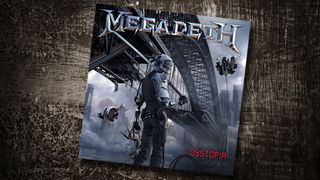
Lead drums, lead bass
By the time Loureiro reached the studio, Dystopia was underway. Adler was excused the first week of tracking as his wife was ill. Mustaine and Ellefson pressed on regardless.
I just figured ‘F*** this!’ This is a record that is really important for me. I’m going to do this by myself
“This is something I think is unprecedented,” laughs Mustaine, “making a record and starting with a click track and a bass performance. I knew what I had in my mind’s eye, how the song was going to sound finished, and he just started doing his performance and I’m playing drums on his leg as he’s playing.”
Rhythm parts, bass and drums were recorded at Lattitude South Studio in Liepers Fork, Tennessee – way out in the boondocks. Lead guitars and vocals were tracked downtown at Zac Brown’s Southern Ground studios in Nashville. Toby Wright was initially involved as producer but was “let go” early in the album’s conception.
For the first time in their career, having not found a producer to see it through, a Megadeth album was produced by Mustaine alone. “I just figured ‘Fuck this!’” he says. “This is a record that is really important for me. I’m going to do this by myself.”
At first, Loureiro watched and listened to see what might work and what wouldn’t. When the time came, he felt comfortable offering his input.
“If an idea doesn’t work for a song or doesn’t work for the concept, that’s all good, let’s bring another one,” he says. “And that’s the way you can be creative and help through the whole process of creating an album. I had to understand what was cool, what was not, what belongs in Megadeth. If you know the concept, where to go, it’s easier to record a solo. You just go in there and improvise and something cool is going to happen.”

Rust in pineapple
Mustaine’s partnership with Loureiro is a fascinating contrast. There’s Mustaine,“pentatonic kinda guy… very blues-orientated”; and Loureiro, schooled in latin and world music.
I don’t play like Marty Friedman but he was a guy who was trying to mix exotic stuff into thrash metal
Loureiro is the exotic flavor, the burnt pineapple in Megadeth’s sound. Mustaine doesn’t like the sound of that – “I’m going to tell him you said that,” he snaps. “If you start talking about hotdogs, I’m outta here.” Loureiro’s cool with that assessment, though.
“The pineapple at the top? Yeah, why not! I think exotic is a good thing so I take it as a compliment. Creativity is combining things. The more and more different styles you combine the more interesting you’ll probably get. I don’t play like Marty Friedman but he was a guy who was trying to mix exotic stuff into thrash metal and that’s why he has such a unique style. That’s my goal as a musician.”

Panic at the disco
Mustaine also bristles at the suggestion that the bass and drum groove to the intro of Peace Sells… could be disco (in terms of tempo and Ellefson’s insistent, funky bass). “Peace Sells? Are you high?” he protests. “That’s not disco. Fuuuuck! I hope this isn’t contagious.”
He thought the “super-rhythmic” Crush ’Em from 1999’s Risk was what we meant, a song that he admits to not wanting to write. That the band’s previous management had an influence on his creative choices seems incredible.
If you follow the golden carrot to get on MTV or video channels and stuff like that, you find yourself making compromises
Mustaine is such a strong personality, charismatic and forthright, it seems impossible that anyone other than him could have an authorial influence on his work. Mustaine talks so positively about finally making music that he likes, music for himself, that it’s hard to believe that it was ever any other way.
“Yeah, you know the answer to that question, buddy,” he says. “You have record labels and management telling you what to do, and you’ve got decisions you need to make; are you going to make a song that no one’s ever gonna want to listen to and say, like, I’m being true to myself? Great.
“It’s like that fucking scene in Purple Rain, the guy goes up to Prince and says, ‘No one understands your music but yourself.’ And there’s a fine line... When you start turning yourself inside out for radio play or trying to follow the golden carrot to get on MTV or video channels and stuff like that, you find yourself making compromises and to compromise is to come in second, isn’t it?”

Taking care of business
To that end, Dystopia marks a sea change in how Megadeth do business. They have “real metal management” now. No more hitchasing. No more Crush ’Em. No more Risk. No looking back.
The Conjuring’s a great song, but it’s got fuckin’ devil worshipping in it. I can’t [play that]
A Rust In Peace lineup reunion was mooted but Mustaine thought better of it. Likewise, rumour had Megadeth re-recording their debut, Killing Is My Business… And Business Is Good!.
“That was small talk,” scoffs Mustaine. If sentiment was in the air at all, might Megadeth re-record The Conjuring with lyrics sensitive to Mustaine’s Christian beliefs? It’s a great song. “Only because there’s a hex in it! No. That song’s a great song, but it’s got fuckin’ devil worshipping in it. I can’t.”
And that’s it. Time’s up. Mustaine rises, “Burnt pineapple?! Wait ’til I tell him. Go get something to eat, buddy,” and off he goes down that endless corridor towards the vanishing point. Business as usual… and business is booming.
Megadeth’s new album, Dystopia, is out 22 January 2016 on Tradecraft Records.
Don't Miss
Megadeth's Dave Mustaine: my top 5 tips for guitarists
Dave Mustaine on Super Collider, Endgame, Risk and more
Megadeth's Dave Mustaine talks guitar, politics and today's music

Jonathan Horsley has been writing about guitars and guitar culture since 2005, playing them since 1990, and regularly contributes to MusicRadar, Total Guitar and Guitar World. He uses Jazz III nylon picks, 10s during the week, 9s at the weekend, and shamefully still struggles with rhythm figure one of Van Halen’s Panama.
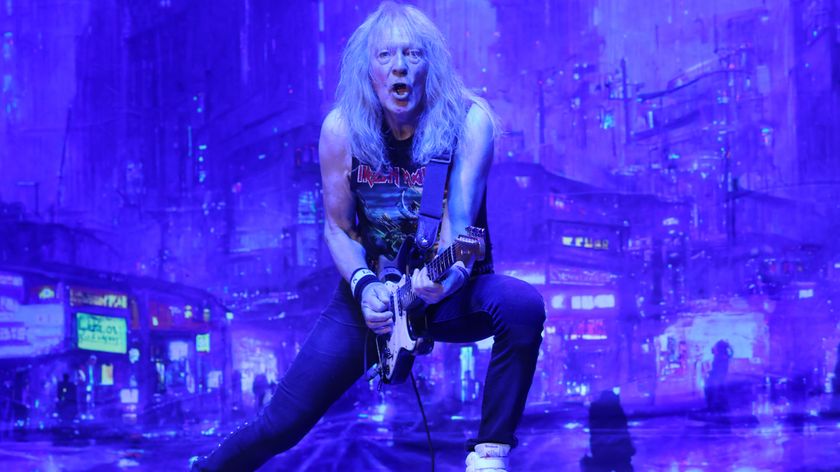
“People say to Pete Townshend, ‘Why do you jump about on stage?’ He doesn’t know. And it’s the same for me”: The Iron Maiden guitarist who plays every gig as if it’s the last
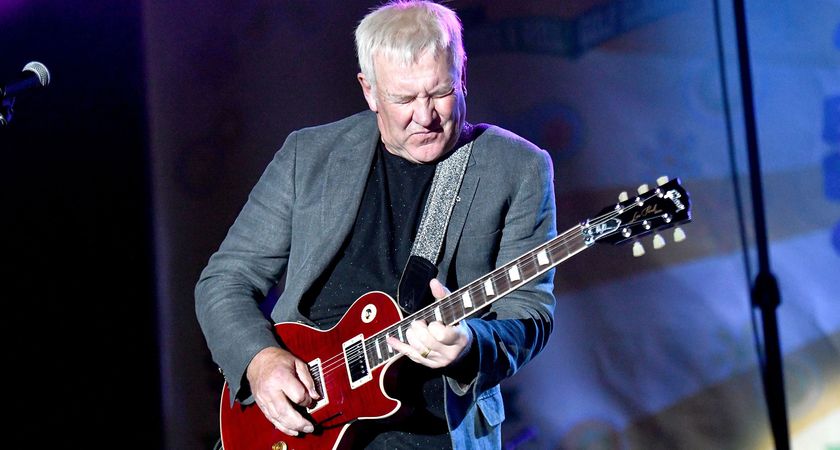
“Not that I was restricted in any way with Rush. I’m very proud of what we did. But this is a whole different kind of experience”: Alex Lifeson on disguised guitars, soloing strategies and finding fresh sounds and freedom with Envy Of None

“People say to Pete Townshend, ‘Why do you jump about on stage?’ He doesn’t know. And it’s the same for me”: The Iron Maiden guitarist who plays every gig as if it’s the last

“Not that I was restricted in any way with Rush. I’m very proud of what we did. But this is a whole different kind of experience”: Alex Lifeson on disguised guitars, soloing strategies and finding fresh sounds and freedom with Envy Of None


